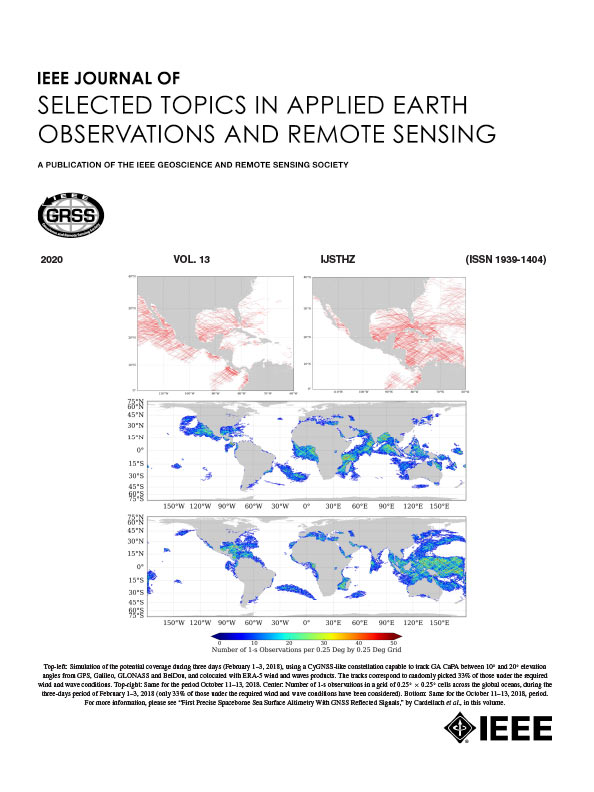基于深度子域自适应球面度量的无监督SAR细粒度船舶分类
IF 4.7
2区 地球科学
Q1 ENGINEERING, ELECTRICAL & ELECTRONIC
IEEE Journal of Selected Topics in Applied Earth Observations and Remote Sensing
Pub Date : 2025-06-20
DOI:10.1109/JSTARS.2025.3581551
引用次数: 0
摘要
无监督域自适应(UDA)是一种很有前途的方法,它利用源域的大量标记样本来解决目标域无标记数据的SAR细粒度船舶分类问题。本文提出了一个新的框架,即具有深度子域自适应的球面度量精细化,以解决现有UDA方法很少认识到的两个关键问题,即优先考虑自适应而不是细粒度分类,以及由于欧氏特征规范而阻碍跨域对齐和区分。该方法将特征转换为球面空间,消除范数偏差,引入分类和自适应联合优化,平衡判别特征学习和域不变性。在GF-SAR和HR-SAR数据集上的实验表明,该方法的分类准确率分别达到95.33%和89.33%,比现有方法提高了5.33-6.00%。我们的GF-SAR和HR-SAR数据集已经在GitHub上发布。本文章由计算机程序翻译,如有差异,请以英文原文为准。
Unsupervised SAR Fine-Grained Ship Classification via Spherical Metric Refinement With Deep Subdomain Adaptation
Unsupervised domain adaptation (UDA) is a promising method for addressing the problem of SAR fine-grained ship classification in target domain with no labeled data available by leveraging a large number of labeled samples from source domains. This article proposes a novel framework, spherical metric refinement with deep subdomain adaptation, to address two crucial issues that are rarely recognized by existing UDA approaches, namely prioritizing adaptation over fine-grained classification and hindering cross-domain alignment and discrimination due to Euclidean feature norms. The proposed solution transforms features into spherical space to eliminate norm bias and introduces joint optimization of classification and adaptation, balancing discriminative feature learning and domain invariance. Experiments on GF-SAR and HR-SAR datasets demonstrate state-of-the-art performance, achieving 95.33% and 89.33% classification accuracy, respectively, outperforming the existing methods by 5.33–6.00%. Our GF-SAR and HR-SAR datasets have been released on GitHub.
求助全文
通过发布文献求助,成功后即可免费获取论文全文。
去求助
来源期刊
CiteScore
9.30
自引率
10.90%
发文量
563
审稿时长
4.7 months
期刊介绍:
The IEEE Journal of Selected Topics in Applied Earth Observations and Remote Sensing addresses the growing field of applications in Earth observations and remote sensing, and also provides a venue for the rapidly expanding special issues that are being sponsored by the IEEE Geosciences and Remote Sensing Society. The journal draws upon the experience of the highly successful “IEEE Transactions on Geoscience and Remote Sensing” and provide a complementary medium for the wide range of topics in applied earth observations. The ‘Applications’ areas encompasses the societal benefit areas of the Global Earth Observations Systems of Systems (GEOSS) program. Through deliberations over two years, ministers from 50 countries agreed to identify nine areas where Earth observation could positively impact the quality of life and health of their respective countries. Some of these are areas not traditionally addressed in the IEEE context. These include biodiversity, health and climate. Yet it is the skill sets of IEEE members, in areas such as observations, communications, computers, signal processing, standards and ocean engineering, that form the technical underpinnings of GEOSS. Thus, the Journal attracts a broad range of interests that serves both present members in new ways and expands the IEEE visibility into new areas.

 求助内容:
求助内容: 应助结果提醒方式:
应助结果提醒方式:


